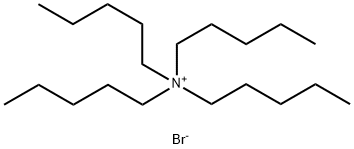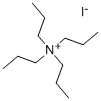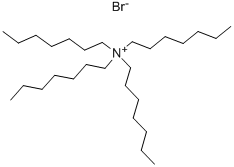PRODUCT Properties
| Melting point: | 100-101 °C (lit.) |
| Density | 0.92333 g/cm3 (35.00℃) |
| refractive index | 1.5260 (estimate) |
| storage temp. | Inert atmosphere,Room Temperature |
| Water Solubility | Soluble in water |
| form | Shiny Flakes |
| color | White |
| PH | pH(10g/l, 25℃) : 5.0~7.0 |
| λmax | λ: 240 nm Amax: 0.04 λ: 250 nm Amax: 0.03 λ: 260 nm Amax: 0.02 λ: 500 nm Amax: 0.02 |
| BRN | 3658171 |
| InChI | InChI=1S/C20H44N.BrH/c1-5-9-13-17-21(18-14-10-6-2,19-15-11-7-3)20-16-12-8-4;/h5-20H2,1-4H3;1H/q+1;/p-1 |
| InChIKey | SPALIFXDWQTXKS-UHFFFAOYSA-M |
| SMILES | [N+](CCCCC)(CCCCC)(CCCCC)CCCCC.[Br-] |
| EPA Substance Registry System | Tetrapentylammonium bromide (866-97-7) |
Description and Uses
Tetrapentylammonium bromide can be used:
- As a versatile structure-directing agent for the synthesis of Zeolite-like heterobimetallic cyanide frameworks.
- As an alkylating agent for rhodium(I)-catalyzed alkylation reaction of benzylic amines and for N-alkylation of azaheterocycles.
- As a precursor to prepare a Cobalt-complex, {[(Pentyl)4N]3CoBr3}Cl2, which is used as a catalyst in the synthesis of multiwalled carbon nanotubes (MWCNTs).
Electrochemical synthesis of stable graphite intercalation compounds (GICs) containing tetrapentylammonium cations has been reported.
Safety
| Symbol(GHS) |  GHS07 |
| Signal word | Warning |
| Hazard statements | H315-H319-H335 |
| Precautionary statements | P261-P264-P271-P280-P302+P352-P305+P351+P338 |
| Hazard Codes | Xi |
| Risk Statements | 36/37/38 |
| Safety Statements | 26-37/39 |
| WGK Germany | 3 |
| HS Code | 29239000 |




